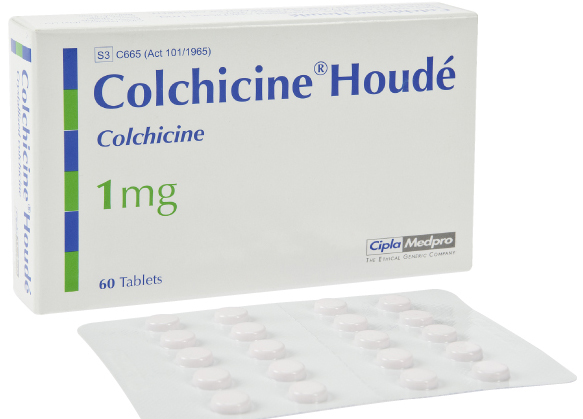Today's drug is colchicine.
First of all, what is colchicine?
INDICATIONS :
- Colchicine is an anti-gout agent.
- It is specifically indicated for treatment and relief of pain in attacks of acute gouty arthritis. ( sudden, severe pain in one or more joints caused by abnormally high levels of uric acid in the blood)
- It is also used to treat familial Mediterranean fever (FMF; an inborn condition that causes episodes of fever, pain, and swelling of the stomach area, lungs, and joints) in adults and children 4 years of age and older.
- It is not a pain reliever and cannot be used to treat pain that is not caused by gout or FMF.
- It is also used as prophylaxis to prevent attacks of gout.
MECHANISMS OF ACTION :
- it exerts its effect by reducing the inflammatory response to the deposited urate crystals and also by diminishing phagocytosis in joints. It inhibits lactic acid production by leucocytes, thereby interrupting urate deposition and inflammatory response that sustains the acute gout attack and therefore helps to reduce pain and tenderness.
How is colchicine taken?
ROUTE OF ADMINISTRATION :
- It is taken orally as tablets.
- It should be taken with or after food to reduce stomach upset.
- It should also be taken with plenty of water.
- Grapefruit or grapefruit juice should not be taken during treatment with colchicine.
Are there any possible side effects?
SIDE EFFECTS :
(i) Most common possible side effects:
- Nausea, vomiting, stomach pain and diarrhoea. These may be reduced if colchicine is taken with food, before bed or by eating little and often. If patient is sick, suggest them sticking to simple foods such as dry toast, and drink plenty of liquid. If patient experiences nausea, vomiting or diarrhoea during treatment for an acute attack, ask he/she to stop taking the medicine.
- Loss of appetite.
- Patients older than 65 may be at increased risk of gastrointestinal bleeding.
There are some rare but potentially serious side effects with colchicines. If patient experiences any of
these side effects, refer he/she to doctor straight away.
- Skin rash, fever or hair loss.
- Severe diarrhoea with bloody or black tarry stools.
- Difficulty in passing urine or blood in urine.
- Confusion or convulsions.
- Numbness or weakness in the fingers and toes.
- Bleeding, mouth ulcers or infection associated with low blood cell counts. This is more likely when colchicine is taken in high doses for acute gout or taken for a long time.
Other rare side effects include headache, dizziness, difficulty sleeping, seizures, tremor,
shortness of breath and muscle weakness.
Very rarely, death has occurred when colchicine has been taken in overdose.
(iii) Long term possible side effects:
PRECAUTIONS :
Ask patients if they have :
(i) Ulcers or serious gastrointestinal conditions.
(ii) Kidney and liver diseases.
- Colchicine should be used with caution if kidney or liver function is significantly reduced.
(iii) taking other medicines, such as :
- cyclosporin – this is a medicine used to suppress the immune system
- erythromycin – this is an antibiotic used to treat bacterial infection;
- clarithromycin – this is an antibiotic used to treat bacterial infection. It can be used to treat Helicobacter pylori, which is the bacteria that can cause stomach ulcers.
- Colchicine should be used carefully if taken at the same time as:
- acidifying and alkalinising agents, such as ammonium chloride, ascorbic acid (vitamin C) or sodium bicarbonate
- verapamil, diltiazem and amiodarone
- anti-fungal treatments such as ketoconazole
- medicines to help to sleep
- anticoagulants such as warfarin
- antithyroid medicines
- Aspirin can be used safely in the low doses taken for prevention of heart attack and
stroke. Patient with gout should avoid taking aspirin in all other circumstance as at
higher doses it can raise the uric acid level.
- Colchicine can usually be taken safely with anti-inflammatory drugs (NSAIDs), as long
as patient's kidney function is reasonably normal.
- The simple pain reliever, paracetamol, and combined medicines such as Panadeine and Panadeine Forte, can be used while taking colchicine provided patient take them as directed.
More drug interaction of colchicine ---> click Mee!
Alcohol:
- Alcohol can trigger an attack of gout. When taking colchicine, keep alcohol intake to a minimum i.e. 1-2 standard drinks, once or twice a week. Drinking a lot (more than 6-8 standard drinks) on one occasion, even if infrequently, is strongly discouraged. In some cases total abstinence from alcohol is recommended.
- In addition to alcohol, other things that may trigger an acute gout attack include dehydration, diuretics and stopping colchicine treatment.
Pregnancy and breastfeeding:
- Colchicine is not often used by women who may wish to get pregnant. The effects of colchicine during pregnancy have not been well studied, so it is not clear if colchicine causes birth defects.
- If patient is pregnant or is considering having a child, she should discuss this with her doctor before beginning this medication.
Please kindly drop some comments if u think there's something to be added or somewhere to be improved. Ur comments are much appreciated.. Thank you!




































0 comments:
Post a Comment